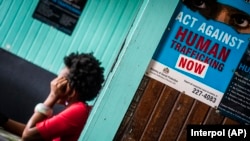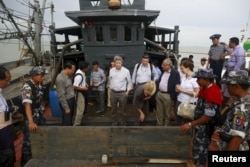Convicted human smuggler Yadvinder Singh Bhamba is headed to a U.S. prison for the second time in his life.
A federal judge in Puerto Rico this week sentenced the India-born Bhamba, who also goes by the name Yadvinder Singh Sandhu, to five years behind bars for his "leadership role" in a complex Caribbean-based network that brought at a minimum hundreds of travelers to the United States illegally from 2013 to 2016.
Bhamba, who pleaded guilty earlier this year to one count of conspiracy and 15 counts of smuggling aliens for profit, told a federal agent his clients would usually live without authorization once in the U.S., or apply for political asylum. Most were from India and Sri Lanka, according to court documents.
The scheme often involved a web of bribed officials and doctored passports in a multi-stop trip from South Asia to the Caribbean. A different smuggler took charge of each leg of travel, as Bhamba described it. He focused on the last stretches, but was in contact with other smugglers across the world.
The Middle East and South America were popular transit spots, Bhamba said in an interview with the agent. Sometimes it was easier through Colombia, sometimes Argentina or Guyana. There were arrivals in Haiti, then land transfers to the Dominican Republic. Other times there were stops in St. Kitts or St. Martin, Jamaica or Curacao. Usually the Bahamas. Ultimately, the trip would end with a boat ride to the United States — Puerto Rico or Florida — at times, in dangerous conditions.
"The boat trips organized by Bhamba and his co-conspirators were perilous," the U.S. Department of Justice said in a news release earlier this year. "Boat captains used old, damaged, cracked, unlicensed, overcrowded, and unsafe boats to make the journey."
At least one client died in a boat en route to the U.S., though Bhamba, in his interview with a federal agent, blamed his client's pre-existing liver condition.
The smuggling link between India and the U.S. is well-established, fueled by criminal enterprises large and small. Last month, a 38-year-old man admitted to participating in a smuggling ring to bring Indians on commercial flights. Two other Indian nationals faced similar charges in 2016. And in 2009, a Guyanese woman was accused of bringing Indians illegally into the U.S. through a circuitous route in Latin America.
Back in the game
Bhamba was a smuggling expert from early on: At age 20, he said, he traveled from India to Canada, then crossed the border into the United States. Now 60, Bhamba became involved with one smuggling operation, ferrying travelers on the U.S. side of their journey from when they made landfall to their final destinations in the country. He was arrested in Florida in 1999.
After his first human smuggling conviction in 2000 and serving one year and one day in federal prison for "bringing in and harboring aliens," Bhamba went straight, he said, according to court documents. That is, he went straight from being deported from the United States to smuggling himself back in, by his account.
In India, he used his contacts to get a real passport with a fake name, then a real visa back to the U.S.
Bhamba worked in hotels as a manager, in North Carolina, then California. Sometimes he made a living as a courier. He had a son, born Sept. 11, 2001. Yes, he told the federal agent questioning him, "Same day, same time." After his first wife died in a car crash, he married a woman in Ohio — under the fake name in his real passport, Rajinder Kumar, he said during the interview.
By April 2013, Bhamba was back in the smuggling game.
Two years and one month later, he was sitting before an investigator from U.S. Immigration and Customs Enforcement, who was asking him how he ended up charging clients tens of thousands of dollars, making his living off the smuggling enterprise.
You can't stop the business, he told the agent, because it functions like a franchise. And the smugglers are expendable, replaceable.
In 2017, Bhamba was indicted on the 16 counts, to which he later pleaded guilty.
"At times, the smugglers would take passports from the aliens during their journeys, physically assault them, and threaten their families to collect money," DOJ described in a news release.
Clients paid between $30,000 and $85,000 to be smuggled from India to the United States.
'It will never stop'
The trip that led to Bhamba's arrest was in July 2016, six months after 15 would-be emigrants left India for the U.S.
The 6-meter wooden boat left the Dominican Republic for Puerto Rico with no basic safety gear — no lights or navigational system. It was overloaded, with 15 travelers plus those piloting the boat, which was built to carry just eight people.
Bhamba was arrested in the Dominican Republic in 2017. He is being held at a federal prison in Guaynabo, Puerto Rico, and faces possible deportation on his release.
"I can give you the root, where it starts," he told the investigator early in the 2015 interview, attempting to eke out any leniency from law enforcement in exchange for explaining the operation. "I know the ugly side, how it keeps going. Just by arresting one person, who's doing it, and, you know, the main guy who's financing it, he finds another guy. He finds another guy. He finds another guy, officer."
"They keep going on," Bhamba added. "It will never stop."






